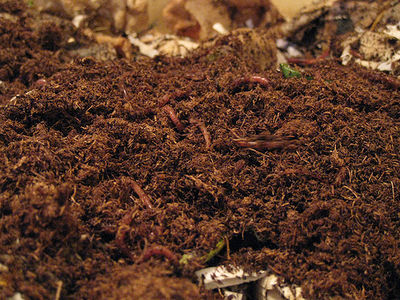Vermiculture: Difference between revisions
Jump to navigation
Jump to search
(→Links) |
No edit summary |
||
| Line 1: | Line 1: | ||
{{Category=Soil and compost}} | {{Category=Soil and compost}} | ||
[[File:Worms.jpg|right|400px]]Worms are a key part of most good local food systems. Their main purpose is to convert food waste into compost, which is excellent fertilizer for plants. Vermiculture is the practice of intensively farming worms; these worms then can be scattered around the garden, where they will improve the soil structure and nutrient profile, or they can be fed to small livestock | |||
==Uses== | ==Uses== | ||
Revision as of 04:20, 6 March 2011
Main > Food and Agriculture > Soil and compost
Worms are a key part of most good local food systems. Their main purpose is to convert food waste into compost, which is excellent fertilizer for plants. Vermiculture is the practice of intensively farming worms; these worms then can be scattered around the garden, where they will improve the soil structure and nutrient profile, or they can be fed to small livestock
Uses
- Chicken feed
- Fish feed in aquaponics
- Aerating soil
- Making compost and compost tea for fertilizing gardens
DIY wormeries
- Multi-layer vermiculture bin
- 5 dollar, 1/2 hour Worm Composting Bin(s)
- It's a Vermiculture World
- The Worm-A-Rater
- Worm bin bag for indoor vermicomposting and easy separation of worms from compost
- Worm Cafe - Compost with earthworms right in your garden
